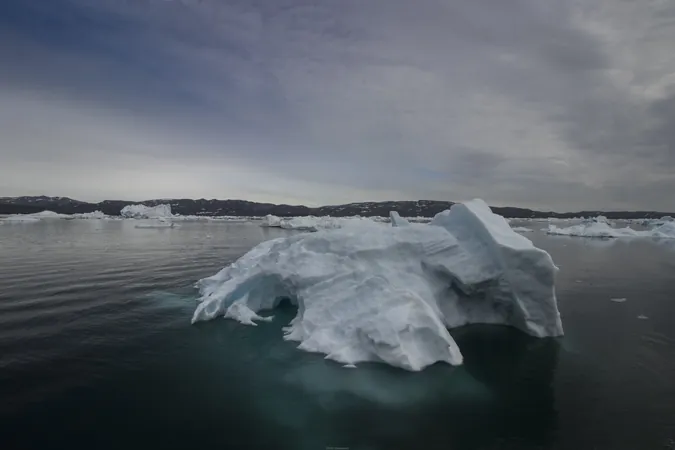
The Arctic's Alarming Projection: An Ice-Free Ocean by 2027?
2024-12-09
Author: Arjun
The Arctic's Alarming Projection: An Ice-Free Ocean by 2027?
In a shocking revelation, a group of scientists has warned that the Arctic could face its first ice-free day as soon as 2027, according to a new report published in the esteemed journal, Nature Communications. This alarming prediction underscores the rapid decline of Arctic sea ice, a phenomenon largely driven by global warming and greenhouse gas emissions.
The current trend shows that Arctic sea ice cover is diminishing at a staggering rate of approximately 12% per decade. Researchers have observed a distressing shift from a predominantly white Arctic Ocean to a predominantly blue one in summer months. For climate specialists, the threshold for considering the Arctic 'ice-free' is when the sea ice drops below a million square kilometers, a scenario that now appears increasingly plausible.
To assess the severity and speed of this potential ice loss, the research team analyzed various predictive models. The forecasts varied considerably, with some models suggesting the first ice-free day could happen in just three years, while others pushed this date to the year 2100. Alarmingly, 11 of the models indicated that we might reach an ice-free state by 2027, with additional models predicting a timeframe within four to six years. In all, 34 analyses concluded that the first ice-free day would occur within the next decade.
Why is Arctic Sea Ice So Crucial?
The implications of dwindling ice are profound, extending beyond just the Arctic region. The scientists pointed out that the loss of sea ice has 'cascading effects on the entire climate system,' including the warming of the upper ocean and an acceleration of climate change. This sets the stage for more extreme weather events at mid-latitudes, which could directly impact global weather patterns.
Not just humans will suffer from these changes; wildlife is at risk too. The report highlighted that the diminishing summer sea ice cover poses a severe threat to the already fragile Arctic ecosystem, endangering everything from polar bears to essential zooplankton species.
A Call to Action
The crux of the study is to 'raise awareness of the potential for a rapid loss of sea ice in the near future.' Researchers identified numerous factors that could contribute to this scenario, particularly preconditioning from warmer atmospheric conditions in preceding years. This is notably true for autumn conditions, where prolonged warmth extending into December could exacerbate ice loss.
The study revealed that a combination of warmer conditions in the Barents Sea, sustained warm air throughout winter, and early springs with trapped warm air over the Arctic, all served to weaken the ice. 2023 has already seen unprecedented global temperatures, and the past decade has recorded the ten hottest years since the 1850s.
Despite this dire outlook, there is a glimmer of hope. Scientists argue that a significant reduction in greenhouse gas emissions could not only delay the expected timeline for an ice-free Arctic but also minimize the duration that the ocean remains ice-free.
As the world grapples with the impending consequences of climate change, the need for immediate action has never been more urgent. The fate of the Arctic could hinge on our choices today. Are we ready to confront this challenge?



 Brasil (PT)
Brasil (PT)
 Canada (EN)
Canada (EN)
 Chile (ES)
Chile (ES)
 España (ES)
España (ES)
 France (FR)
France (FR)
 Hong Kong (EN)
Hong Kong (EN)
 Italia (IT)
Italia (IT)
 日本 (JA)
日本 (JA)
 Magyarország (HU)
Magyarország (HU)
 Norge (NO)
Norge (NO)
 Polska (PL)
Polska (PL)
 Schweiz (DE)
Schweiz (DE)
 Singapore (EN)
Singapore (EN)
 Sverige (SV)
Sverige (SV)
 Suomi (FI)
Suomi (FI)
 Türkiye (TR)
Türkiye (TR)